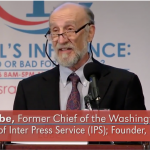by Jim Lobe
Contrary to the long-standing neoconservative mantra that the left poses a greater threat to Jews than the right, a national poll released late last week suggests that Democrats are considerably more sensitive to—and worried about—anti-Semitism than Republicans.
The Quinnipiac University survey, conducted March 2-6, found a yawning difference between Republicans and Democrats on whether they considered “prejudice against Jewish people in the United States today … a very serious problem.” Over half of self-identified Democrats (51%) agreed that it was indeed “very serious,” while less than one in five (18%) Republican respondents described it that way.
A total of 87% of Democrats said that they considered the problem either “very” or “somewhat” serious. By contrast, only 53% of Republicans agreed—a 34-point gap.
Overall, 35% of the 1,283 respondents considered such prejudice “very serious,” while an additional 35% described it as “somewhat serious.”
Nearly half of Republican respondents (45%) said anti-Semitism was either “not so serious” a problem (30%) or “not at all” a problem (15%). By contrast, only 8% of Democrats said it was “not so serious,” and a mere 3% said chose the “not at all” option.
The survey, which also found big gaps between Republicans and Democrats over their respective perceptions of whether “the level of hatred and prejudice in the U.S. has increased” since Trump’s election (84% of Democrats but only 42% of Republicans said yes), came in the wake of an unprecedented surge of bomb threats against Jewish schools and community centers and vandalism of Jewish cemeteries.
The White House’s prolonged silence in response to these crimes has provoked growing unease within U.S. Jewish community. So has the administration’s failure to mention Jews or anti-Semitism in its first Holocaust Remembrance Day statement on January 27 and its appointment of key advisers associated with the so-called alt-right movement. The silence was not broken until Trump referred to the threats and desecrations in his February 28 address to Congress by “condemning hate and evil in all of its very ugly forms.”
The Anne Frank Center for Mutual Respect compared Trump’s remarks to placing a “Band-Aid on the cancer of anti-Semitism that has infected his own administration.”
Asked about the Trump administration’s response to the threats and vandalism, 71% of Republicans said they approved, while 5% disapproved. Among Democrats, a mere 10% voiced approval, while two-thirds disapproved. Independents were roughly evenly divided, 39-36%.
Connection to Israel
Although one survey can hardly be considered conclusive, the Quinnipiac poll offers an interesting counterpoint to a January Pew poll about partisan attitudes toward Israel. That poll, conducted January 4-9, found that three of every four self-identified Republicans (74%) said that they sympathize more with Israel than Palestinians (11% said more with Palestinians). By contrast, only 33% of Democrat said they were more sympathetic to Israel. That was only two percentage points more than those Democrats who said they sympathized more with Palestinians (31%).
Pew said that the 41-point gap on that question between the two parties was the largest since 1978. In that year, 49% of Republicans and 44% of Democrats sympathized more with Israel, according to a poll by the Chicago Council on Foreign Relations (renamed the Chicago Council on Global Affairs) which posed the same question.
The increase in Republican support for Israel presumably reflects in major part the steadily rightward drift of the GOP. This is turn was driven largely by the greatly increased influence of evangelicals and their mostly Christian Zionist leadership whose theology, as noted (euphemistically) by Irving Kristol in 1984, was pro-Israel but “not exactly pro-Jewish.” The parallel drift to the right by the Jewish majority in Israel no doubt has also contributed to both the growing Republican commitment to the Zionist state, especially under Benjamin Netanyahu, as well as the growing disillusionment with it among Democrats.
In recent years, Kristol’s ideological progeny, led by Commentary magazine and other neoconservative outlets (as well as Netanyahu and his government), have tried very hard to link criticism of Israel, which has come mostly from the left, with anti-Semitism. Although some criticism of Israel has indeed been motivated by anti-Semitism, it’s also clear from the Quinnipiac survey that significantly fewer people on the right than people on the left, at least as represented by the poll’s Democratic respondents, see anti-Semitism as a “very serious problem.” Indeed, judging by the poll results, Republicans appear to be relatively complacent about both the rash of incidents and the Trump administration’s response.
The results are also hard to square with the notion that criticism of Israel by people on the left of the political spectrum is often rooted in anti-Semitism. If, after all, so many Democrats see anti-Semitism as a “very serious problem,” their views of Israel are unlikely to be tainted by prejudice against Jews.
Of course, it should be clear to virtually any informed individual—and especially to U.S. Jews—that anti-Semitism on the right (or the alt-right) poses the greater threat by far. What with people ensconced in the White House like former Breitbart CEO Stephen Bannon, who professes admiration for the notorious French anti-Semite and reactionary Charles Maurras, and Sebastian Gorka, who has ignored the Anti-Defamation League’s demand that he renounce his far-right and anti-Semitic Hungarian associations, the alt-right is becoming mainstreamed in the Republican Party.
Attitudes toward Minorities
For now, to be sure, their focus is directed primarily against other minority groups, notably Muslims and Latino immigrants. In that respect, one of the most remarkable findings of the Quinnipiac survey is the enormous partisan gap on the seriousness of the problem of prejudice against minority groups in the United States today. No less than 76% of Democratic respondents said it was “very serious” compared to 16% of Republicans—a staggering 60-point divide. And while 41% of Republican respondents insisted that the problem was either “not so serious” or “not at all” serious,” only a tiny 4% of Democrats agreed with those assessments.
Bret Stephens, one of the few neocons who early on sensed where Republicans were headed, warned just over a year ago:
It would be terrible to think that the left was right about the right all these years. Nativist bigotries must not be allowed to become the animating spirit of the Republican Party. If Donald Trump becomes the candidate, he will not win the presidency, but he will help vindicate the left’s ugly indictment.
Of course, Stephens was wrong about the election outcome, but he was right about Republicans and their trajectory. On the eve of the election, he was more explicit about the threat faced by Jews if Trump and his alt-right entourage emerged victorious. Noting the anti-Semitic dog whistles used by the campaign and its supporters, he wrote, “American Jews shouldn’t have to re-live the 1930s…”
The Republican Jewish Coalition should take heed.
Photo: Protesters in Washington, DC by Lorie Shaull via Wikimedia Commons






@Jeffrey Wilens.
You have, in various posts here, described Jews who do not subscribe to your particular interpretation of Zionism as imbecilic and self-hating, as well as comparing them to Kapos – all deeply offensive to any such persons.
You do know the meaning of the word “chutzpah”? Leo Rosten defined it well: “that quality enshrined in a man who, having killed his mother and father, throws himself on the mercy of the court because he is an orphan”.
Bill, over the years, I have found that arguments between non Zionist, anti-Zionist and anti-Likud Jews on the one hand, and ardent champions of political Zionism/ pro-irredentist Jews on the other, invariably devolve at some point into arguments over who is a Jew, who is a self-hating Jew (lol), and/or whose vision of Jewishness is more true to the “Jewish soul”. It’s the Bundists and cultural Zionists vs the political Zionists all over again except that this time the political Zionists, broadly construed, are in the majority. On every occasion, I can’t help but laugh at the ironies that crop up now as they did back in the day. Chief among them for me is the irony of calling Jews who are detached from political Zionism “self-hating” while representing the “Diaspora Jewish experience” through the most antisemitic, goyish (I mean no disrespect) of lenses. Of Jabotinsky, Michael Stanislawski (Zionism and the Fin de Siecle) writes: “[H]e proceeded to create a version of Zionism that consciously attemptetd to destroy the traditional stance of East European Jewry not through what he took to be the self-defeating stricture of socialism, of which the Jews, he believed, would inevitably be the victim. Like Max Nordau, but within the East European Jewish world itself, in Russian and increasingly in Hebrew and Yiddish as well, he argued steadfastly that the hunchbacked, stooped, weak and sniveling East European Jew must be reformed into a hard, cold, dignified — indeed, Aryan — new kind of man and Jew, imbued with a militant and cold patriotism reminiscent of Minister Gammin Jabotinsky’s pre-Zionist play, Krov’ (Blood).”
I’m all for hybridity, but this sort of fin-de-siecle masculinist, Nietzschean “muscular Judaism” strikes me not only as antithetical to the Jewish spirit, but also a mockery of it. It represents the ironic triumph of goyish male notions of masculinity and codes of honor and the defeat of what I personally would regard as more civilized Jewish notions of masculinity — and humanity.
Deborah, that debate you allude to is over. The “weak and sniveling Jews” are all dead, many of them murdered. The “muscular Judaism” (actually “muscular Jewishness”) is not antithetical to the Jewish spirit, it is the spirit of the ancient Jews from the Patriarchs through the Hasmoneans and Bar Kokhba.
“Civilized notions” are not adequate to survive in this world.
Over the past two millennia, Bar Kokhba was generally presented as an example of folly in the rabbinic tradition. How times change.
And how easy it is for some self-styled saviors of the Jewish people to drip with contempt as they describe my deceased relatives, victims of the Shoah, as weak and snivelling Jews — air quotes notwithstanding. Not a very Jewish virtue, as far as I’m concerned. Matter of fact, my grandma Fannie would have called it the rhetoric of “prostehs.” How quickly these purveyors of Muskeljudentum (frequently loosely translated as “muscular Judaism” because it was borrowed wholesale from the contemporaneous “muscular Christianity”) — how quickly they forget all the immigrants to Israel who never did manage to adapt to the Zionist (romantic E. European socialist) ideal of redemption through rural labor. How quickly they forget the vigor and courage displayed by the prewar majority of Jewish Bundists and Bundist sympathizers in America. But of course, that’s how myths are born: through selective amnesia and distorted, self-serving memories. One thing’s for sure. Judaism didn’t survive for 2,000 years by embracing the cynical ethos of social darwinism, but by zealously upholding the dignity of all human beings, weak and strong alike. In the words of Rabbi Heschel: “Who is a Jew? A person whose integrity decays when unmoved by the knowledge of wrong done to other people.”